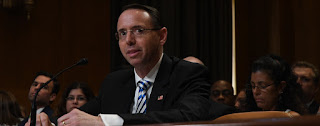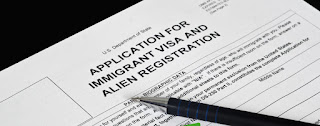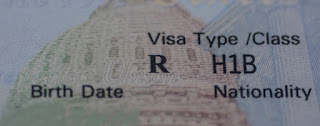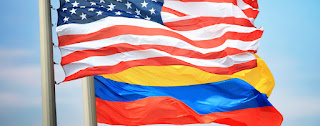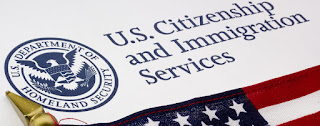On March 27, 2019, the Department of Justice's (DOJ) Executive Office for Immigration Review (EOIR) published advance notice of proposed rulemaking with request for comment in the Federal Register (FR) at 84 FR 11446 (Mar. 27, 2019) [
PDF version]. The EOIR is seeking public comment on or before April 26, 2019, on several proposals involving its rules and procedures governing representation and appearance in proceedings before EOIR immigration courts and the Board of Immigration Appeals (BIA).
Background and Current Rules
Section 240(b)(4)(A) of the Immigration and Nationality Act (INA) gives aliens the privilege of being represented at removal proceedings at no expense to the Government. The alien may be represented by counsel of his or her choosing provided that the individual is authorized to practice in removal proceedings. The right to counsel is also discussed in section 292 of the INA.
The statutes are developed in the Attorney General's regulations. Under 8 C.F.R. 1292.1, attorneys in good standing and other accredited representatives are authorized to represent respondents in proceedings before the EOIR. Under specified circumstances, other types of individuals may be permitted to represent respondents in EOIR proceedings (e.g., law students under specified types of supervision and reputable individuals requested by the respondent for an individual case).
Citing to regulations, the FR notice explains that an attorney or representative must enter an appearance by filing the Form EOIR-28 to represent a respondent in EOIR proceedings or a Form EOIR-27 to represent a respondent before the BIA. Representation continues “until and unless the immigration judge or the BIA, whichever applies, grants an oral or written motion to withdraw or substitute.”
Beginning in 2015, the DOJ allowed limited appearances by attorneys and accredited representatives so that they could, under certain circumstances, enter an appearance solely for custody and bond proceedings. After assessing public comments, the DOJ ultimately required the representative of record to represent individuals “in all respects of each separate type of proceeding, unless the immigration judge grants a motion to withdraw or substitute counsel.” 80 FR 59500, 59501 (Oct. 1, 2015). Under 8 C.F.R. 1003.17(a), an attorney or authorized representative may enter an appearance for “custody and bond proceedings only, any other proceedings only, or for all proceedings.”
Under 8 C.F.R. 1003.38(g) and 1292.4(a), an attorney or authorized representative who enters an appearance to represent a respondent before the BIA will represent the respondent “until and unless withdrawal or substitution of attorney or representative is permitted.” (Description from instant FR notice.)
8 C.F.R. 1001.1(i) defines the term “practice” in the context of representing individuals before the EOIR and BIA:
(i) The term practice means the act or acts of any person appearing in any case, either in person or through the preparation or filing of any brief or other document, paper, application, or petition on behalf of another person or client before or with DHS, or any immigration judge, or the Board.
The term “preparation” is defined in these contexts at 8 C.F.R. 1001.1(k):
(k) The term preparation, constituting practice, means the study of the facts of a case and the applicable laws, coupled with the giving of advice and auxiliary activities, including the incidental preparation of papers, but does not include the lawful functions of a notary public or service consisting solely of assistance in the completion of blank spaces on printed Service forms by one whose remuneration, if any, is nominal and who does not hold himself out as qualified in legal matters or in immigration and naturalization procedure.
Request for Public Comments
The EOIR proposes no new rules in its FR notice. Instead, it is soliciting public comments on several issues pertaining to the aforementioned regulations. All comments must be submitted on or before April 26, 2019, in order to be considered in the rulemaking process. Any member of the public may submit comments, although “the Department is particularly interested in hearing from all those who have a state in providing, receiving, or coordinating representation in the immigration court system.” The EOIR is presenting the following questions for commenters to consider and respond to (quoted directly from the FR notice):
- Question 1: Should the Department permit certain types of limited representation currently impermissible under regulations? If so, to what extent? If not, why not?
- Question 2: Should limited representation be permitted to allow attorneys or representatives to appear at a single hearing in proceedings before EOIR, possibly leaving the respondent without representation for a subsequent hearing on the same filing? If so, to what extent? If not, why not?
- Question 3: Should limited representation be permitted to allow attorneys or representatives to prepare or file a pleading, application, motion, brief, or other document without providing further representation in the case? If not, why not? If so, should attorneys or representatives be required to identify themselves as the author of the document or should anonymity (i.e., ghostwriting) be permitted?
- Question 4: If limited representation is permitted in proceedings before EOIR, should an attorney or representative be required to file a Notice of Entry of Appearance regardless of the scope of the limited representation? If so, should a form separate from the EOIR-27 and EOIR-28 be created for such appearances?
- Question 5: If limited representation is permitted, should attorneys or representatives certify to EOIR, either through a form or filings made, that the alien has been informed about the limited scope of the representation?
- Question 6: If limited representation is permitted in proceedings before EOIR, to what extent should such attorneys or representatives have access to the relevant record of proceedings?
- Question 7: To what extent could different approaches for limited representation impair the adjudicative process or encourage abuse or other misconduct that adversely affects EOIR, the public, or aliens in proceedings, or lead to increased litigation regarding issues of ineffective assistance of counsel?
- Question 8: What safeguards, if any, should be implemented to ensure the integrity of the process associated with limited representation in proceedings before EOIR, and to prevent any potential abuse and fraud?
- Question 9: What kinds of constraints or legal concerns with respect to limited representation may arise under state rules of ethics or professional conduct for attorneys who are members of the bar in the various states?
- Question 10: Should EOIR provide that practitioners, as a condition of representing aliens in a limited manner, be required to agree to limit their fees in charging for their services?
- Question 11: The Department is interested in gathering other information or data relating to the issue of expanding limited appearances in EOIR proceedings. Are there any additional issues or information not addressed by the Department's questions that are important for the Department to consider? Please provide as much detail as possible in your response.
The EOIR advises commenters that comments will be more helpful if they “reference a specific regulatory section, provide draft regulatory language, explain the reasons for the recommended amendment, and include data, information, or authority that support the recommended amendment.”
Analysis and Conclusion
The EOIR's questions for the public suggest that it is considering expanding the number of situations in which an attorney or authorized representative may represent an individual in EOIR proceedings in a limited capacity for a particular purpose. The questions evince concern with the possible ramifications of expanding limited representation on alien respondents and the adjudicative process. Furthermore, the questions broach technical issues regarding to the implementation of new limited representation rules if they were to be adopted.
Any potential expansion of limited representation in EOIR and/or BIA proceedings would be significant to practitioners and aliens in proceedings. We will update the website with more information if and when the DOJ announces new rules.
Aliens facing removal proceedings should seek immediate counsel immediately to ensure that their rights and interests are protected. Please see our articles on removal and deportation defense [
see category], immigration detention [
see category], and criminal aliens [
see category] to learn more about this and related issues.
Please visit the
nyc immigration lawyers website for further information. The Law Offices of Grinberg & Segal, PLLC focuses vast segment of its practice on immigration law. This steadfast dedication has resulted in thousands of immigrants throughout the United States.








